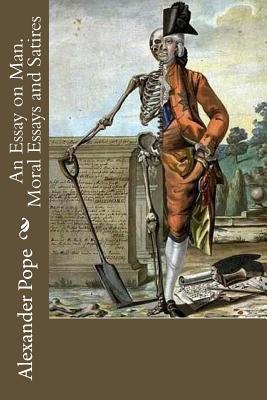
An Essay on Man. Moral Essays and Satires
Paperback
Fiction AnthologiesGeneral European HistoryGeneral Poetry
Please select the version of book you would like to purchase.
ISBN10: 197577468X
ISBN13: 9781975774684
Publisher: Createspace
Published: Aug 25 2017
Pages: 184
Weight: 0.56
Height: 0.39 Width: 5.98 Depth: 9.02
Language: English
ISBN13: 9781975774684
Publisher: Createspace
Published: Aug 25 2017
Pages: 184
Weight: 0.56
Height: 0.39 Width: 5.98 Depth: 9.02
Language: English
An Essay on Man is a poem published by Alexander Pope in 1734. It is a rationalistic effort to use philosophy in order to vindicate the ways of God to man (l.16), a variation of John Milton's claim in the opening lines of Paradise Lost, that he will justify the ways of God to men (1.26). It is concerned with the natural order God has decreed for man. Because man cannot know God's purposes, he cannot complain about his position in the Great Chain of Being (ll.33-34) and must accept that Whatever IS, is RIGHT (l.292), a theme that was satirized by Voltaire in Candide (1759). More than any other work, it popularized optimistic philosophy throughout England and the rest of Europe. Pope's Essay on Man and Moral Epistles were designed to be the parts of a system of ethics which he wanted to express in poetry. Moral Epistles have been known under various other names including Ethic Epistles and Moral Essays. On its publication, An Essay on Man met with great admiration throughout Europe. Voltaire called it the most beautiful, the most useful, the most sublime didactic poem ever written in any language.[citation needed] In 1756 Rousseau wrote to Voltaire admiring the poem and saying that it softens my ills and brings me patience. Kant was fond of the poem and would recite long passages of the poem to his students. Later however, Voltaire renounced his admiration for Pope and Leibniz's optimism and even wrote a novel, Candide, as a satire on Pope and Leibniz's philosophy of ethics. Rousseau also critiqued the work. He questioned Pope's uncritical assumption that there must be an unbroken chain of being all the way from inanimate matter up to God.
8 different editions
Also available
Also in
Fiction Anthologies
Frankenstein, Dracula, Dr. Jekyll and Mr. Hyde
Shelley, Mary
Stevenson, Robert Louis
Stoker, Bram
Paperback
$8.50
The World of Jane Austen: A Conversation Puzzle: 500-Piece Puzzle: Jigsaw Puzzle for Adults
Oakley, Jacqui
Other
$22.00
Book Nooks: Inspired Ideas for Cozy Reading Corners and Stylish Book Displays
Gilhuly, Claire
Dina, Vanessa
Hardcover
From $17.99
Arabic Stories for Language Learners: Traditional Middle Eastern Tales in Arabic and English (Online Included) [With CD (Audio)]
Mansur, Lutfi
Brosh, Hezi
Paperback
$18.95
Obvious Adams -- The Story of a Successful Businessman: New Business Edition
Updegraff, Robert R.
Paperback
$8.95
How To Understand Your Bible: A Philosopher's Interpretation of Obscure and Puzzling Passages
Hall, Manly P.
Paperback
$14.99
The Liberty Scarf: A Story of Three Women, One War, and a Scarf That Binds Them Together
Runyan, Aimie K.
Ciesielski, J'Nell
McMillan, Rachel
Paperback
$18.04
Shadows of Carcosa: Tales of Cosmic Horror by Lovecraft, Chambers, Machen, Poe, and Other Masters of the Weird
Chambers, R. W.
Lovecraft, H. P.
Bierce, Ambrose
Paperback
From $9.99
Japanese Folktales for Language Learners: Bilingual Legends and Fables in Japanese and English (Free Online Audio Recording)
Sato, Anna
Sato, Eriko
Paperback
$18.99
Othello: The Moor of Venice: The Oxford Shakespeareothello: The Moor of Venice
Shakespeare, William
Paperback
$10.40
Fearsome Creatures Of The Lumberwoods: With A Few Desert And Mountain Beasts
Cox, William T.
Paperback
$18.95


 Sign-In
Sign-In Cart
Cart